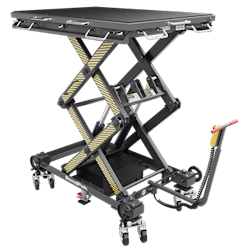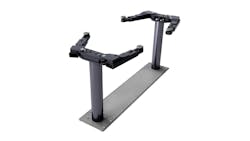The auto landscape is changing, with more and more EVs entering the scene. That means shops need to investigate if their equipment still meets the needs of all their customers’ vehicles. This is particularly important regarding lifts and lift tables, as EVs such as the Ford Mustang Mach-E SUV weighs 33% more than the gasoline version, while the Ford F-150 Lightning can weigh one ton more than a traditional F-150.
But capacity is just the start, and lift manufacturers have been busy retooling designs to not only meet the needs of new EVs, but the shops that service them as well.
To upgrade or not to upgrade?
Whether your shop should or shouldn’t upgrade depends on this one very important question: What are you using the equipment for? If you’ve set up your shop in a less populated rural area, chances are you’re not seeing many, if any, electric vehicles. However, if your shop is in Southern California, servicing EVs is a certainty.
Even so, this doesn't mean your shop needs to upgrade, as certain jobs can be outsourced. But, if you’re looking to expand your shop’s range of jobs, then you’ll need to ask yourself the next most important question—what’s the wheelbase of the vehicles you service?
Read more: Latest lifts to elevate shop profitsCarl Boyer, Midwest regional sales manager for Stertil-Koni, says prospective lift customers should consider the range of their vehicle wheelbases and weight. "Typically, they want to maximize their lift to get the widest variety of vehicles on the lift,” he advises.
To find the right lift to suit their customer’s needs, Boyer notes, they want to know the customer’s shortest and longest wheelbase vehicles. From there, they also take a look at what work the shop will be doing on the lift – oil changes, quick maintenance, etc.—as that also factors into the decision of which style of lift the shop will need. However, Boyer cautions that not every lift manufacturer will have what’s best for your shop’s needs. Each company can only speak to the styles of lifts they manufacture, so it is in your best interest to do all of the research before settling on which lift to purchase.
Lift modifications
As mentioned previously, EVs are much heavier than the average car. With the battery alone weighing around 1,000 lbs., EV lifts must have an increased lifting capacity. The battery location has also created a need for lift modifications.
“The lift market is expanding to meet unique EV needs,” says Brian Spikes, vice president and general manager at Challenger Lifts. “OEs have made lifting points more specific to accommodate delicate wiring and EV battery locations.”
It’s important the lift can hit those specific points, otherwise the equipment could cause interference with the vehicle’s battery, notes Jason Matthews, product manager, automotive lifts for Rotary Lift. This interference could lead to vehicle damage or an inability to do the required repairs.
Lift manufacturers trying to stay ahead of the curve are working on modifying their lifts and lift accessories to cater to the electric vehicle market. Here are four EV lift manufacturers creating products to help shops prepare for the future of the industry.
BendPak
Announced at the 2023 NADA Expo, the BendPak Mobi-EVS EV battery and powertrain lifting system family includes the upgraded EV2400SL and the new EV4000SL.
“Mobi-EVS lift tables can handle high-voltage battery packs from a Tesla Model 3 to a Ford F-150 Lighting all the way up to a GMC Hummer EV1,” says Jeff Kritzer, president and CEO of BendPak. “They protect technicians by eliminating manual lifting, lowering, and positioning of heavy battery packs and making it easy to ergonomically move them around the shop.”
Both models feature full-length utility trays on both sides for keeping tools within reach, a stowable steering handle, zero-throw tri-casters, and an integrated slip-plate deck that enables side-to-side shifting up to 1.5" along both axis for adjustability. The EV2400SL has a 2,400-lb. capacity, while the EV4000SL has a 4,000-lb. capacity and the capability to elevate to more than 6' in less than 20 seconds.
Challenger Lifts
Recently introduced at SEMA 2022, Spikes says, Challenger Lift’s medium duty 5K Mobile Columns "will allow shops with limited space to have the flexibility of a mobile column system in a more compact form and at lower price point.”
As a set of four, the wireless mobile columns are able to lift 20,000 lbs. and can lift vehicles from the wheels. This gives technicians total undercarriage access on both electric and larger vehicles.
Challenger also offers two EV lift tables—the BT3000 and the BT3300. Though both lift tables can be used to install and remove EV batteries, battery packs, transmissions, etc., the BT3000 offers a higher maximum height at 79.5" and has a rechargeable battery. On the other hand, the BT3300 can be easily maneuvered with its pallet-jack-style handle and extending, adjusting, and tilting top plate.
Rotary Lift
One of Rotary Lift’s newer lifts, the Wide Smartlift, allows better accessibility to EV batteries. Though Matthews notes that their lifts have always had clearance, he says “the difference between that and our standard Smartlift is that the plungers are farther away from each other. And that provides the clearance needed to be able to remove electric batteries." He explains that previously if a shop had an in-ground lift, the way they were constructed typically would have interfered with the electric battery.
To complement the Wide Smartlift, Rotary Lift has the LT33A Air-Hydraulic Lift Table. The table can shift in sections with the lift platform extending an additional 8", which eliminates the need to move the entire table when multi-positioning larger loads. Additionally, the tabletop can shift side-to-side by an inch and can tilt up to 1 degree. The variety of adjustments helps technicians easily line up vehicle components during installations. Rotary’s lift table also features foot pedal controls.
Stertil-Koni
With EVs becoming more and more prevalent in the market, many lift manufacturers, such as Stertil-Koni, are looking at the equipment they currently offer and trying to find ways to adapt it, so it not only works with electric vehicles but also the legacy vehicles on the road and the vehicles being transitioned from internal combustion to electric.
Just as important as the EV lift itself are the EV lift tables used for lowering the battery from the vehicle. Getting the vehicle off the ground is just step one – shops need additional EV lift accessories to finish the job, such as Stertil-Koni’s SKTJ Hydraulic Transmission Jack.
“What we have right now is actually a transmission jack that’s on swivels, and it has its own hydraulic piston that would come up to meet the batteries, and then lower [them] down safely,” says Tim Kerr, engineering sales support manager for Stertil-Koni. “So that’s currently what we’re trying to work on and expand the capabilities [of].”
Kerr notes that they are looking to potentially add a large battery table to the jack, and with the equipment’s 3,500-lb capacity, it would be able to handle lifting and lowering any EV battery.






